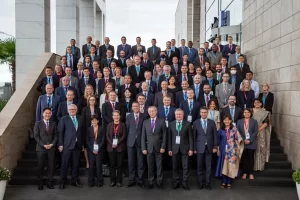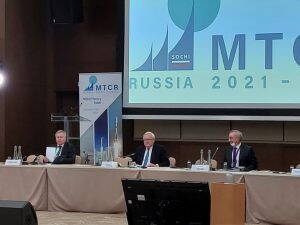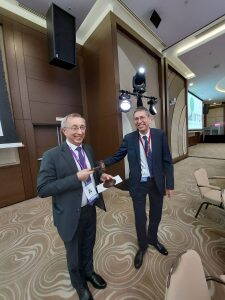 Missile Technology Control Regime
Missile Technology Control Regime
Public Statement from the Plenary Meeting of the Missile Technology Control Regime Sochi, 8 October 2021
The Missile Technology Control Regime (MTCR) held its 33rd Plenary Meeting in Sochi from 4th to 8th October 2021. H.E. Sergey Ryabkov, Deputy Foreign Minister of Russia, welcomed participants at the opening of the meeting. The Plenary was chaired by Ambassador Grigory Mashkov from the Ministry of Foreign Affairs of the Russian Federation, who will remain the Chair of the MTCR until the next Plenary Meeting scheduled for 2022.
In his opening statement Mr. Ryabkov gave a general outline of the global security architecture with particular emphasis on missiles. He observed that the rapid development of missile technology had been making an increasingly significant impact on the international and regional security landscape. Noting the absence of multilateral legally-binding instruments on missile threat reduction and the fragmentary nature of the states’ political commitments and bilateral agreements in that field, he spoke for launching of an inclusive and comprehensive dialogue on missiles in all its aspects between wide range of states on the basis of equality and mutual respect of each other’s interests. He valued MTCR as an important non-proliferation tool which should not be directed against any specific country but maintain the common cause and grapple with missile proliferation challenges.
The Plenary Meeting, not having been able to assemble in Innsbruck as planned, acknowledged the relentless work undertaken by the Austrian Chair Ambassador Thomas Hajnoczi and his Team under the COVID-19 restrictions and reviewed and evaluated the MTCR’s activities over the period since the Auckland Plenary in 2019 in order to advance the efforts of Partners to prevent the proliferation of unmanned delivery systems capable of delivering Weapons of Mass Destruction (WMD) (nuclear, chemical and biological weapons). The Partners expressed their appreciation to the Russian Federation for organising the Plenary meeting in Sochi.
Partners recalled that the proliferation of WMD and their means of delivery remain a threat to international peace and security. They reiterated their commitment to limiting the risks of proliferation by controlling international transfers of goods and technology which can contribute to delivery systems for WMD. They held a thorough exchange of information on missile proliferation developments.
Partners welcomed the fact that the MTCR Guidelines and the Annex (control list) constitute an international best practice benchmark for controlling exports of missile-related items and technologies, noted that these standards are adhered to by an increasing number of non-Partners and are included in some UN Security Council resolutions.
Partners will continue to work with other states, in accordance with their national legislation and consistently with international law, to prevent the transfer of goods and technology which could contribute to WMD missile programmes.
In the interests of regional and international security, Partners appealed to all states to support the non-proliferation aims of the Regime by observing its Guidelines and establishing appropriate national legislation and law enforcement mechanisms. From this perspective, Partners emphasized that observance of the MTCR Guidelines by as many states as possible will contribute substantially to limiting the ongoing risks of the proliferation of delivery systems for WMD and to fostering international security. Partners invited states to declare, on a voluntary basis, adherence to the MTCR Guidelines and Annex and to formally notify the MTCR Point of Contact in writing of their establishment of controls consistent with the Annex and Guidelines and their political commitment to control all of the items on the Annex according to the MTCR Guidelines, including any subsequent changes to the Annex or Guidelines. Current MTCR adherents include Estonia, Kazakhstan and Latvia.
Partners underlined that the MTCR Guidelines are not designed to impede technological advancement and development, including space programmes, as long as such activities could not contribute to the proliferation of delivery systems for WMD.
Partners conducted extensive discussions on, and expressed concern about, global missile proliferation activities, in particular ongoing missile programmes in Asia and the Middle East, which might fuel missile proliferation activities elsewhere. Partners also encouraged relevant bodies and institutions to pay attention to the role of export controls in preventing the proliferation of missiles capable of carrying WMD.
With regard to the DPRK, Partners recalled relevant UN Security Council Resolutions, including inter alia 2371, 2375 and 2397, and took note of the international community’s continued obligations under the Resolutions, and confirmed their support for ongoing diplomatic processes and efforts to achieve lasting peace on the Korean Peninsula. Bearing in mind the ballistic missile launches over the past two years and continual missile technology development by the DPRK, Partners reiterated the need for full compliance by the DPRK with these Resolutions and their commitment to exercising the necessary vigilance when controlling transfers that could contribute to the DPRK’s ballistic missile programme. With regard to Iran, Partners recalled UN Security Council Resolution 2231 and took note of the international community’s continued obligations under the Resolution, including its ballistic missile provisions in Annex B. Concerns were expressed in relation to the implementation of Resolution 2231.
Partners agreed to continue exchanging views on these and other global missile program developments.
In the years ahead, the Regime will continue its outreach to non-partners in an effort to limit the spread of missile systems capable of delivering WMD, as well as their related technology and equipment. Partners expressed particular appreciation for the outreach activities conducted by New Zealand and Austria Chairs in 2019/2020 and 2020/2021. Russia, as current MTCR Chair, was encouraged to conduct further outreach activities and contacts and to maintain the momentum of dialogue with previously visited countries. Partners also encouraged the continuation of individual, collective and regional efforts to assist non-Partner states and other interested parties in implementing missile-related export controls, including as required under UNSCR 1540, and to inform the Chair about these activities.
Partners reaffirmed the importance of the MTCR’s technical work. They underlined that the rapid technological development and changes in proliferant procurement practices related to sensitive items and technologies, including intangible technology transfers, continue to require greater awareness and to be effectively addressed.
Partners expressed their appreciation for the work of the MTCR’s Licensing and Enforcement Experts Meeting (LEEM), Technical Experts Meeting (TEM) and the Information Exchange Meeting (IEM). They recognized that the Equipment, Software, and Technology Annex remains a cornerstone of the work done by the MTCR to prevent missile proliferation. In the IEM and LEEM, Partners continued discussions on issues including ballistic missile developments and tests; proliferation trends and procurement activities; and evolving strategies in support of programmes for WMD delivery means; as well as serious risks and challenges posed by intangible technology transfers; catch-all controls for non-listed items; transit and trans-shipment issues; approaches to outreach to industry; and national experiences to strengthen export control enforcement. Information-sharing between Partners was highly appreciated, and will further strengthen national export control regimes and enforcement systems.
Partners exchanged views on issues relating to future membership and individual applications for membership were thoroughly discussed. The issue of membership will continue to be on the agenda.
Partners reviewed a number of issues relating to the internal operation of the MTCR. They warmly welcomed Switzerland’s chairing of the Regime in 2022 – 2023.
Partners noted the address on behalf of the Chair of the Hague Code of Conduct Against Ballistic Missile Proliferation (HCoC), Permanent Representative to the International Organizations in Vienna, Ambassador Gustavo Ainchil.
Partners thanked France for its highly efficient work as the Regime’s Point of Contact to ensure continuity in the functioning of the MTCR. Partners also thanked Canada for maintaining the MTCR website (info).
The MTCR has 35 members: Argentina, Australia, Austria, Belgium, Brazil, Bulgaria, Canada, the Czech Republic, Denmark, Finland, France, Germany, Greece, Hungary, Iceland, India, Ireland, Italy, Japan, Luxembourg, the Netherlands, New Zealand, Norway, Poland, Portugal, the Republic of Korea, the Russian Federation, South Africa, Spain, Sweden, Switzerland, Turkey, Ukraine, the United Kingdom and the United States of America.


